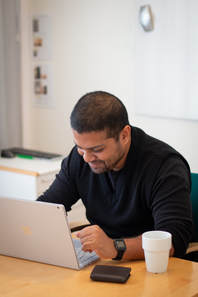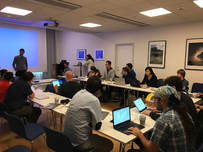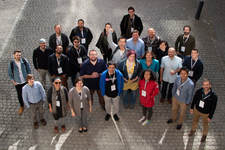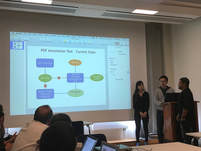| by Gihan Samarasinghe It was my third visit to Europe representing UNSW, and excitingly this was my first visit to both Paris and Stockholm. I was already honored to be invited for The inaugural Evidence Synthesis Hackathon (23rd to 25th April 2018 at the Stockholm Environment Institute, Sweden), and then Shinichi figured that the second annual conference of the Collaboration for Environmental Evidence (CEE) is taking place in Paris just before the hackathon. As the timing was superb, I was planning to visit the conference too (16h to 20th April at Université Paris-Est Marne-la-Vallée, Paris, France). The whole tour was all exciting and fruitful, and had the only downside: I was missing my wife’s PhD thesis submission. |
I landed in Paris on 18th of April (with a whole-Paris public transport strike waiting there to welcome me), so I could only make the latter part of the third day of the conference. Last two days of the conference I attended had the most exciting sessions for me and our research group. Talks were under two major categories: (a) discussions on how can technology contribute to evidence synthesis, and (b) presentations / demonstrations of software tools that assist evidence synthesis. Some key discussion points were: (i) using standard formats and tools to report systematic review process, (ii) visualisation and mapping of bibliographies, (iii) automating abstract / full-text screening using text mining, and (iv) potential future uses of machine learning in evidence synthesis.
My talk for the conference extended the fourth discussion point listed above, and my talk was titled “Deep Learning - Potential Uses in Systematic Reviews”. This was my first conference talk without presenting a paper, so it was a whole new experience for me to present something as a short-lecture format. The talk started by introducing the basics of machine learning and deep learning, then the potential uses of the introduced techniques in different stages of systematic reviews. My talk went very well, I got some overwhelming response (and also some good questions). The best comment I got was simply: “I learned from your talk!”. After a few tech talks, there was a technical discussion panel and I could be a part of that, and I enjoyed it. Machine learning was one of the hot topics during the discussions and introduction of proper database systems to keep track of evidence syntheses was equally popular.
After the conference, my next destination was evidence synthesis hackathon in (magnificent) Stockholm, to which I (and some other participants) carried some ideas from the Paris conference. There were hackathon participants who came from all over the word, some from extremely popular places for technology (look up the list of participants here). Some of them were hackathon enthusiasts (who try to participate in every possible hackathon), tech-gurus from industry (well known companies), computer scientists (from well known universities), and academics who mastered evidence synthesis. A computer science (>=80%) and evidence synthesis (<=20%) hybrid like me could fit in well, fortunately.
At the beginning, we all gathered in for a round-table discussion and the hackathon organisers were presenting the open problems in evidence synthesis that we ‘hackers’ could help to solve, and we all pitched in our ideas / plans as well. The whole set of participants then divided into 4 main streams according to the sub-task within evidence synthesis they were trying to ‘hack’: (i) reporting of evidence synthesis processes, (ii) improving search queries, (iii) data extraction from pdf articles and indexing the coded documents, and (iv) data visualisation using systematic maps.
Four participants, including me, were working on the third stream listed above. Our aim was to implement a software tool that assists efficient content extraction from pdf documents during data coding. The most significant barrier during this task was that the pdf files are embedded in highly abstract and protected manner. The main contribution of the prototype application we prepared was accessing contents in pdf articles selectively. The tool was developed around ReactJS JavaScript framework, therefore, it is suitable for deploying as a web application, in a local virtual web-server in a desktop environment or in a centrally hosted web-server. This application takes in a CSV file with fields to be extracted as headers, and loads pdf files from a server folder. The content coding can be performed using a right-click menu that brings up list of fields, and then saves the fields, selected contents / values from the pdf and any user comments back to the CSV file as a new row per single pdf.
Hackathon concluded with us presenting and demonstrating our implementations, concluding discussion session, and a nice dinner outing with the whole group. I mostly value the opportunity to meet and talk with people of different career and academic backgrounds, and the things I could learn from and share with them.
Shinichi for nominating me for both events, introducing me to the key people, and supporting my conference visit and the talk. Neal Haddaway at the Stockholm Environment Institute and Martin Westgate at the Australian National University (https://evidencesynthesishackathon.com/organisers/), for organising the hackathon and the technical discussion sessions at the conference, inviting me for both events and funding my visit to the hackathon





 RSS Feed
RSS Feed